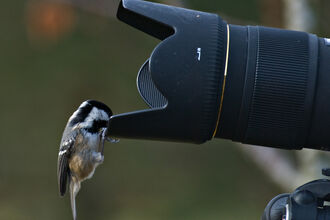Each of our 35 nature reserves is unique – let’s keep them that way!
Our nature reserves are regularly visited by the public, including ramblers, wildlife enthusiasts, families, children and school groups, and all are welcome!
By visiting one of our reserves, you are already showing your appreciation of these special places – please help us protect them for now and for the future.
Protecting our special places
Our nature reserves support both common and rare plants and animals that may not exist anywhere else in North Wales. These plants and animals are vulnerable to even the smallest disturbance. The huge impact of such ‘small disturbance’ can be difficult to comprehend, but they significantly reduce the survival rate of so many species.
Human-induced disturbance (including dogs) can have a significant negative effect on breeding success in many species, by causing nest abandonment, increased predation and significant energy loss. The cumulative effect of very small amounts of stress can have a devastating (often unseen) impact on wildlife.
Even if you don’t think you are causing damage, your actions could be.
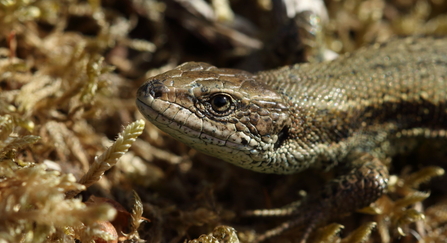
© Vaughn Matthews
Several species are vulnerable to even small levels of disturbance, including the common lizard.
We understand that you want to avoid disturbing wildlife and we want to support you. So how can you help?
- Follow the Countryside Code
- Help Stop the Spread of non-native invasive species by following the three simple biosecurity steps of Check / Clean / Dry every time you are out in the countryside.
- Take your litter home - leave no trace of your visit
- Do not light fires or BBQs
Occasionally, issues such as disturbance of special species or livestock management may mean that we have to exclude visitors and their pets from part of a reserve.
Please look out for and strictly observe all signage on our reserves!
Keep your dog on a lead
Not everyone is fond of dogs – some have crippling phobias or feel extremely uncomfortable if approached by a dog; whilst others could be knocked over, bitten or seriously harmed. Please keep your dog on a lead.
Avoid extendable or long-line leads to minimise distress. If your dog is wandering off the path it will be causing disturbance to wildlife.
On some of our reserves, we may create areas where it is possible to let your dog free to exercise off the lead. Please look out for signs, and don’t let your dog run free unless you see them.
Peter Cairns/2020VISION
Be aware of seasonal grazing animals and wildlife
- Grasslands, wetlands and woodlands are all home to wildlife that may be nesting or resting on or near the ground year round
- Some of our sites and neighbouring land are home to cattle, ponies, and sheep. Bikes, people and dogs can disturb livestock, leading to stress, serious injury and (more often than is realised) the death of grazing animals.
- Remember, your actions can affect other people’s lives and livelihoods.
- Many of our nature reserves are managed with the help of grazing animals at certain times of the year. Please keep a good distance away from livestock and make sure you leave gates as you find them.
- If approached by cattle in a threatening way, release your dog for both your safety and your dog’s.
Snipe are one of the many bird species that can be found feeding on wetland habitats in the winter months.
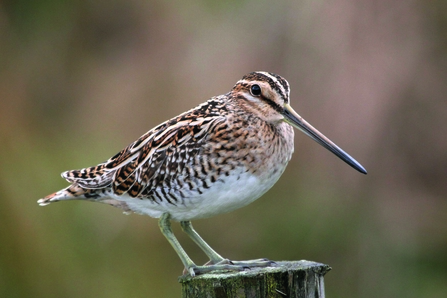
Snipe © Margaret Holland
Always clean up after your dog
Did you know that dog mess causes huge problems for wildlife?
- The increase in nutrients impacts the growth of plants, threatening important species and the wider habitats they live in.
- Dog mess can contaminate pasture and cause diseases in livestock. These diseases cause abortions in cattle and neurological diseases in sheep – and often death.
- Dog mess also poses a serious danger to people. When staff and volunteers are cutting paths to keep them clear for visitors, dog poo can end up all over them, including in their eyes.
- As a responsible visitor who cares about this reserve, please put your waste in the nearest suitable bin or take it home with you to dispose of.
Neosporosis can cause serious harm to both cattle and dogs. It's a a potentially deadly canine disease dogs can pick up out in fields grazed by livestock.
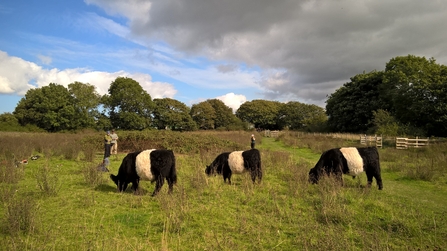
Belted Galloways at Eithinog Nature Reserve © Chris Wynne
Do not enter or allow your dog to enter ponds, rivers or other water bodies
- This behaviour causes huge disturbance in and around areas of open water.
- It increases the risk of transferring invasive and harmful plants, as well as diseases such as Ranavirus, from one area to another.
- Insecticides found in flea and tick products for dogs are highly toxic to all insects and aquatic invertebrates. One dose can kill millions!
- Some ponds are prone to toxic blue-green algae, which can be fatal to dogs if swallowed.
- In hot weather bring adequate drinking water for your dog.
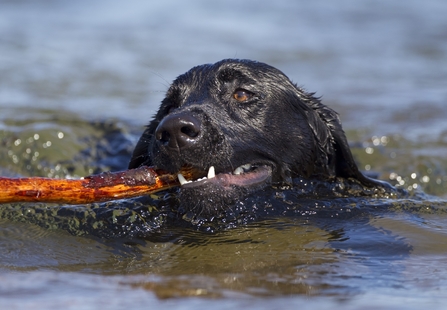
Dog swimming © Peter Cairns/2020VISION

